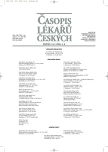Role of Nutritional Factors in the Weight Management
Úloha jednotlivých nutričních faktorů v redukčním režimu
Obezita je dnes jedním z nejvýznamnějších problémů zdravotnictví nejen v rozvinutých, ale i v rozvojových zemích. Vznik obezity je výsledkem pozitivní energetické bilance. Proto je strategie prevence a léčby obezity zacílena na energetickou bilanci. Dietní léčba by měla být zaměřena především na redukci příjmu tuků, protože tuky mají ze všech základních živin nejvyšší energetickou denzitu a vyznačují se nízkou sytivostí a nízkou postprandiální termogenezí. Přestože sacharidy ve srovnání s tuky nehrají tak významnou úlohu v patogenezi obezity, je potřeba při léčbě obezity a metabolického syndromu také omezit příjem jednoduchých cukrů. V průběhu redukčního režimu je nutné zohlednit jak rozdílný metabolický efekt jednotlivých mastných kyselin (polynenasycené a n-3 mastné kyseliny versus nasycené mastné kyseliny) a jednotlivých sacharidů (sacharidy o nízkém a vysokém glykemickém indexu), tak i význam vlákniny. Bílkoviny v redukční dietě příznivě ovlivňují výsledek redukčního režimu svým vlivem na postprandiální pocit sytosti a na postprandiální termogenezi. V poslední době je také zkoumána úloha příjmu vápníku, fosfátu a vitamínu A na regulaci tělesné hmotnosti.
Klíčová slova:
obezita, redukční režim, makronutrienty, vápník, fosfát, vitamin A.
Authors:
K. Kabrnová; V. Hainer
Authors‘ workplace:
Endokrinologický ústav – Centrum pro diagnostiku a léčbu obezity, Praha
Published in:
Čas. Lék. čes. 2005; 144: 529-533
Category:
Review Article
Overview
Obesity has become one of the most serious public health problems affecting both the developed and developing countries today. Obesity develops as a result of the positive energy balance. Therefore the strategies in obesity prevention and management are targeted on the energy balance. Dietary weight management should be focussed on the reduction of fat intake as fat among the three macronutrients exhibits the highest energy density and the lowest satiating properties as well as the lowest postprandial thermogenesis. Although carbohydrate does not play such an important role in the pathogenesis of obesity as fat, the intake of simple carbohydrate should be reduced during the treatment of obesity and metabolic syndrome. Different metabolic consequences of the intake of individual fatty acids (polyunsaturated and n-3 fatty acids vs. saturated fatty acids), individual carbohydrates (low vs. high glycaemic index carbohydrates) and fibre should be considered during the weight management. Dietary protein positively affects the outcome of weight management through the enhancement of postprandial satiety and thermogenesis. Recently a role of consumption of calcium, phosphate and vitamin A in the body weight regulation and weight management has been also studied.
Key words:
obesity, weight management, macronutrients, calcium, phosphate, vitamin A.
Labels
Addictology Allergology and clinical immunology Angiology Audiology Clinical biochemistry Dermatology & STDs Paediatric gastroenterology Paediatric surgery Paediatric cardiology Paediatric neurology Paediatric ENT Paediatric psychiatry Paediatric rheumatology Diabetology Pharmacy Vascular surgery Pain management Dental HygienistArticle was published in
Journal of Czech Physicians

- Metamizole at a Glance and in Practice – Effective Non-Opioid Analgesic for All Ages
- Safety and Tolerance of Metamizole in Postoperative Analgesia in Children
- Obstacle Called Vasospasm: Which Solution Is Most Effective in Microsurgery and How to Pharmacologically Assist It?
- Metamizole vs. Tramadol in Postoperative Analgesia
- Spasmolytic Effect of Metamizole
-
All articles in this issue
- Timing of the First Endomyocardial Biopsy in Heart Transplantation after Induction Immunosuppressive Therapy – Experience from Canadian Heart Transplant Centre
- Current Conceptions of Prophylaxis of Venous Thrombosis in Surgery
- Age-related Macular Degeneration
- Thyroid Diseases in Oncological Patients
- Role of Nutritional Factors in the Weight Management
- Heel Pain
- WHO Recommendations and Information Encountered by Czech Parents
- Comparison of the Prevalence of Non-invasive Risk Markers of the Sudden Cardiac Death in Patients Treated by Thrombolysis and by Percutaneous Transluminal Coronary Angioplasty
- Psychotropic Substances and Traffic Accidents
- Use of Psychotherapy in Patients with Combined Epileptic and Nonepileptic Seizures
- Living Relative Donor for Liver Transplantation in Paediatric Recipient
- Head Injuries and Alcohol Abuse
- Telephone Quitlines as a Part of Complex Services for Tobacco Dependence Treatment
- Journal of Czech Physicians
- Journal archive
- Current issue
- About the journal
Most read in this issue
- Head Injuries and Alcohol Abuse
- Living Relative Donor for Liver Transplantation in Paediatric Recipient
- Heel Pain
- WHO Recommendations and Information Encountered by Czech Parents
